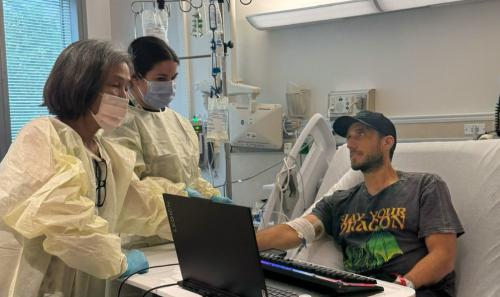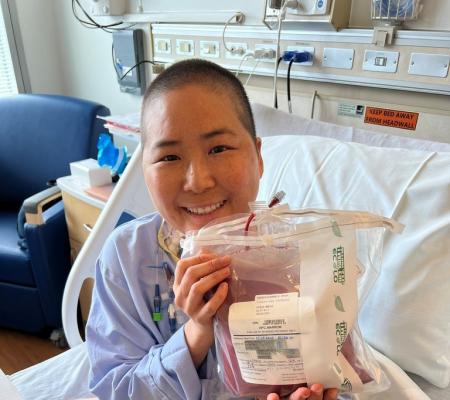
-
Understanding primary immunodeficiency (PI)

Understanding PI
The more you understand about primary immunodeficiency (PI), the better you can live with the disease or support others in your life with PI. Learn more about PI, including the various diagnoses and treatment options.
-
Living with PI
-
Addressing mental health
-
Explaining your diagnosis
- General care
- Get support
- For parents and guardians
-
Managing workplace issues
- Navigating insurance
-
Traveling safely

Living with PI
Living with primary immunodeficiency (PI) can be challenging, but you’re not alone—many people with PI lead full and active lives. With the right support and resources, you can, too.
-
Addressing mental health
-
Get involved

Get involved
Be a hero for those with PI. Change lives by promoting primary immunodeficiency (PI) awareness and taking action in your community through advocacy, donating, volunteering, or fundraising.
-
Advancing research and clinical care
-
Research Grant Program
-
Consulting immunologist
-
Diagnosing PI
-
Getting prior authorization
-
Clinician education
-
Survey research
-
Participating in clinical trials

Advancing research and clinical care
Whether you’re a clinician, researcher, or an individual with primary immunodeficiency (PI), IDF has resources to help you advance the field. Get details on surveys, grants, and clinical trials.
-
Research Grant Program
When Joshua Cash graduated from Florida State University (FSU), he took a 17-day tour across Europe and visited London, Paris, Amsterdam, Venice, Florence, Rome, and locations in Switzerland and Greece. He made lifelong friends and realized that seeing the world fulfilled a yearning for adventure.
“It was the best choice of my life,” said Cash, 26.
Diagnosed with common variable immune deficiency (CVID) and cytotoxic T lymphocytic antigen-4 (CTLA-4) haploinsufficiency, the 26-year-old takes advantage of the healthy times when he can. While he’s remained infection-free for the last year, Cash has experienced his share of highs and lows navigating life with primary immunodeficiency (PI).
“It was a wild ride for me to get to the diagnosis,” he said.
Cash’s medical journey began at 7 when he came home from a laser tag party with a blood-filled bruise on the side of his body, and his parents rushed him to the hospital. Doctors discovered that Cash had low platelets (cell fragments that prevent bleeding) and misdiagnosed him with a blood disorder called immune thrombocytopenia (ITP).
The condition slowly progressed and caused a drop in white and red blood cells. Cash suffered from infections, couldn’t risk engaging in physical activity, and felt exhausted. He missed a lot of school due to frequent hospitalizations and led a sheltered, isolated life through elementary and middle school.
“It was not a good existence,” said Cash, who received blood infusions and steroids to stem the tide of the disease. “A lot of the treatments weren’t really fixing anything because we were treating the wrong thing.”
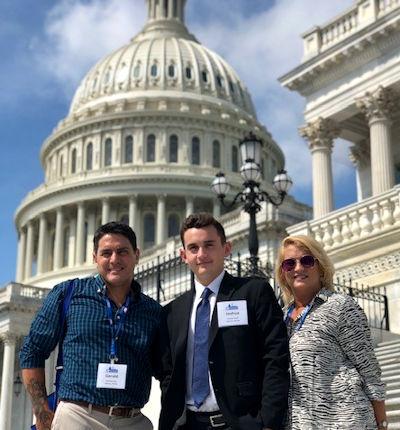
Finally, a doctor prescribed an immune suppressant to boost his blood cells, and his symptoms improved. That led providers down the path of seeking more answers to Cash’s medical challenges—and resulted in the CVID diagnosis.
Proper treatment with antibiotic prophylaxis and eventually immunoglobulin (Ig) therapy treatment put Cash on the road to better health. Although he hid his illness throughout his youth—even going so far as to attend a middle school different from his peers where he wasn’t known as the “sick kid”—by the time Cash got to high school, his social life blossomed. Despite having a limited “social battery” developed over years of isolation, he performed in theater, worked on community service projects, and joined the homecoming court.
“I guess you could say I was a late bloomer because I had to put my entire life on hold for about a decade. I couldn’t explore options because I was a full-time patient, so when I sort of got my health, I’m like, now what? So, I started exploring everything,” said Cash.
Good health continued for Cash as he majored in history and political science at FSU. He transitioned from intravenous Ig therapy to administering subcutaneous Ig therapy and learned that he was missing a copy of the CTLA4& gene after undergoing genetic testing.
In 2020, however, coinciding with the pandemic, Cash’s health took a turn. His dreams of working in federal law enforcement or attending law school were sidelined as he struggled first with Legionnaires' disease and then with pneumocystis pneumonia (PCP). He sought care in emergency rooms, and doctors said they couldn’t prescribe more steroids. His lung condition worsened.
“I was back to square one. Everything just fell apart that we had figured out. It was a completely new challenge that came from the complicated autoimmune issues. There’s no predicting it. It can just come up out of nowhere, and it led me ultimately to going to the NIH (National Institutes of Health),” explained Cash.
“I got accepted at the last possible minute. It was cutting it close for them to be able to save me, and they did. They had the best doctors in the world working on me. They saved my life. That’s not an exaggeration.”
Now recovered, Cash works full-time as an account manager for a logistics company, and he stays in good health by taking immune suppressants, Ig therapy, prophylactic antibiotics, and iron pills. The NIH doctors stay in communication with his immunologist in Tampa, where Cash lives.
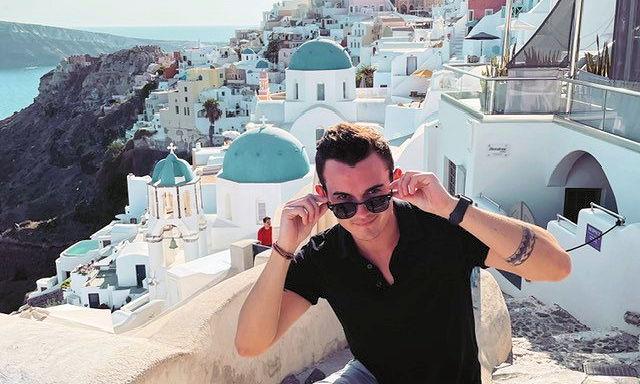
“I have a good team. I’m confident. I don’t have to question anything anymore,” he said.
Cash said he didn’t participate in Immune Deficiency Foundation (IDF) activities until age 18, when he attended a Teen Escape in St. Augustine, Fla. Embracing IDF was a big step toward accepting his PI.
“Because I kept [my condition] a secret for so long and I just wanted to be treated as normal, I didn’t take any assistance. I would tell social workers to leave when they came into my hospital room. I was a stubborn kid, and I didn’t want to go to a support group. I wanted this to not exist. I wanted it to be a complete secret and as little part of my life as possible,” said Cash.
Making connections with other young adults with PI through IDF completely changed his perspective.
“It hit me so hard because I didn’t realize what I was missing. I left the Teen Escape so grateful but angry with myself that it took this long because from this community came friendships and a group of people I’ve known for a decade now. I still beat myself up when I think about how much longer I could have had those people in my corner,” said Cash, who has since attended IDF Conferences and IDF Advocacy Days.
For those young people newly diagnosed, it’s important to advocate for yourself in the medical setting, remain hopeful and pursue your passions, advised Cash.
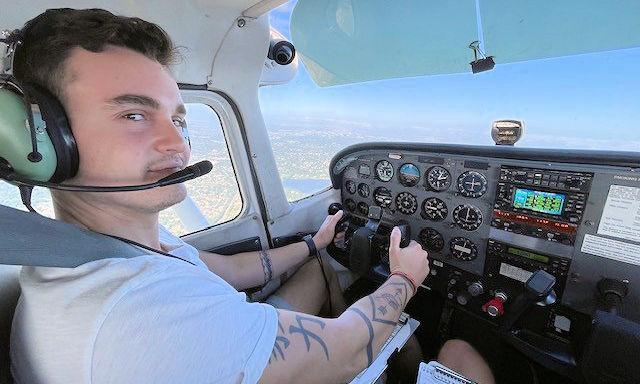
“It will get better. It won’t always be the dark hole that you are in currently. I was in the same position where it did not look like there was a light at the end of the tunnel, but there is, and when that light does come, take advantage of it because you don’t know if something is going to hit you again later,” he said.
“Find something that you love, and as soon as you are healthy enough to do it, do it 100%. Love the healthy times; get through the sick times.”
Related resources
Sign up for updates from IDF
Receive news and helpful resources to your cell phone or inbox. You can change or cancel your subscription at any time.





The Immune Deficiency Foundation improves the diagnosis, treatment, and quality of life for every person affected by primary immunodeficiency.
We foster a community that is connected, engaged, and empowered through advocacy, education, and research.
Combined Charity Campaign | CFC# 66309

